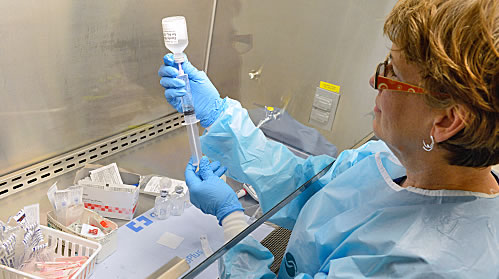
Delivering Tomorrow’s Treatments Today

Cancer clinical trials are research studies designed to find better ways to prevent, diagnose, or treat cancer. For many patients, a clinical trial provides a new treatment option that may be safer or more effective than existing therapies.
Alliance Cancer Specialists offers clinical trials through Sarah Cannon Research Institute (SCRI), one of the world’s leading oncology research organizations conducting community-based clinical trials. SCRI has contributed to pivotal research that has led to the majority of new cancer therapies approved by the FDA today.
Our research program, SCRI at Alliance Cancer Specialists, provides access to the latest clinical trial options to people facing cancer and is part of an expansive research network with the goals of advancing therapies for patients and transforming cancer care within the community, where the majority of people seek cancer treatment.
Research studies are designed to answer specific questions related to the development, production, and evaluation of the effectiveness of new treatments and therapies for diseases. Clinical trials test the benefits of experimental treatments, new medications, combinations of existing drugs and new ways of using known therapies. These tests use the most advanced drug therapies available.
To view current clinical research and trials, please visit the links below.
Select A Category for Available Clinical Trials
Learn More About Clinical Trial Treatments:
Who Is Eligible for a Trial?
Many patients are eligible to participate in a cancer clinical trial. Depending on the study, participants may need to meet certain criteria for type and stage of cancer, age and sex, general health and previous treatment received. These requirements make sure it’s safe for each participant to receive the new treatment. Cancer trials don’t just test new drugs – they focus on many different areas, which means a wide range of patients may be eligible for participation.
Research studies are designed to answer specific questions related to the development, production, and evaluation of the effectiveness of new treatments and therapies for diseases. Clinical trials test the benefits of experimental treatments, new medications, combinations of existing drugs and new ways of using known therapies. These tests use the most advanced drug therapies available.
Trials aim to study areas such as:
![]() Prevention
Prevention
![]() Diagnosis
Diagnosis
![]() Treatment
Treatment
![]() Quality of life or supportive care
Quality of life or supportive care
![]() Screening and early detection
Screening and early detection
![]() Genetics
Genetics
Understanding the Benefits and Risks
Patients considering a trial should understand the risks and benefits so they can make an informed decision about participation.
Potential Benefits to Patients:
- Access to the latest, most promising treatments which might be safer or work better than current treatment options
- Close monitoring by the care team of the patient’s condition and treatment side effects
- An increase in the number of treatment options, even if the patient has not yet had all the standard treatments
- In some cases, the study sponsor may share the cost of care with patients
- A sense of purpose for patients, since they might be helping others who have the same condition in the future
Potential Risks to Consider:
- The treatment might not be better, or even as good as, the existing therapy
- Unexpected side effects may occur, or side effects may be worse than those of the current standard treatment
- Just like existing treatments, a new treatment may offer many benefits to some patients, but may not work for every patient
- Extra patient care costs in a trial may not be covered by health insurance and managed care providers. Coverage varies by each plan and for each study.
Frequently Asked Questions
2. Why Are Clinical Trials So Important?
Data collected during a clinical trial can ultimately lead to a new therapy approval by the FDA and help in developing therapies that are safer and more effective. Additionally, patients who are no longer helped by existing standard of care treatments may find that a clinical trial provides hope and additional treatment options.
3. What Should I Expect?
If you qualify for a trial, your healthcare team will provide you with all applicable information. They will tell you, in a process called informed consent, how the trial will be conducted and the possible risks and benefits of the trial. You will then sign a document stating that you understand the details of the trial and that you are willing to participate. Even after signing the document of informed consent, you may withdraw from the trial at any time for any reason.
The way you receive treatment depends on the specific clinical trial. Clinical trial treatments can come in many forms. These include but are not limited to the following:
- Intravenous (IV) medications
- Shots
- Oral medications
- Surgery
- Radiation
It is important that you follow the therapy protocol as directed and keep all scheduled visits. As with any cancer therapy, clinical trial treatments may come with side effects which your healthcare team will help you manage. It is very important to report to your healthcare team any side effects that you experience because that is part of what is being studied (how the therapy affects the whole body, not just the cancer cells).
4. What Are The Risks?
Through the process of informed consent, your medical team will make sure you understand all the risks and benefits. Because some of the medications being tested are new, side effects may still be unknown.
5. What Happens After The Study?
After the study treatment is complete, participants will continue to be followed for months or even years for health updates. If the participant changes to another healthcare provider, then the research staff may contact the participant via phone. All information collected is analyzed to help determine the study drug’s safety, effectiveness, and side effects. FDA medical advisors and specialists closely review this data before considering any new therapy for approval. Once approved, studies continue to compare the new option with other therapies already on the market. Other studies may research whether it can be administered to a new
patient population, its long-term effectiveness and its impact on quality of life.
Contact our team at clinicaltrials@alliancecancer.com to learn more
Clinical Trial Stages
Clinical trials usually occur in stages that build on each other. Knowing the phase of the trial helps patients understand how much is already known about the treatment, an important factor when deciding whether to join a trial.
Phase I
Aims to identify a safe dose and decide how the treatment (or new use of a treatment) should be administered. Determines how the new treatment affects the body and fights cancer. This is tested with a small group of patients, usually 15–30.
Phase II
Determines if the new treatment has an effect on a specific cancer and continues to study how the new treatment affects the human body. This is usually a larger group of around 100 or less patients.
Phase III
Compares the new treatment with the current standard treatment. This is the largest group of participants with anywhere from 100 to several thousand.
Phase IV
Examines long-term safety and effectiveness after the drug is approved by the FDA.
5 Clinical Trial Myths
- Clinical trial participants might receive a placebo rather than real therapy – Placebos, or inactive medications, are never used in place of the best-known standard of care and are rarely used at all in cancer clinical trials. If a placebo is used, it is given along with an active drug.
- Clinical trials can delay treatment or limit other treatment options – Clinical trials do not limit access to other care; they are completely voluntary. A participant can withdraw from a trial at any time and for any reason to pursue a different course of treatment.
- Clinical trials are not safe because the effectiveness of the treatment is unknown – The ultimate purpose of a clinical trial may be to determine the effectiveness of a new therapy. However, extensive research is conducted on a new treatment before it’s tested with trial participants to ensure safety. Additionally, regulations are in place to protect patients’ rights and ensure trials meet strict scientific and ethical standards.
- Clinical trials are only for patients with advanced cancers – While there are clinical studies only for patients who have tried all treatment options or who have a cancer that is seldom seen, there are also many trials for first line treatment, common cancers, and other subjects of interest.
- Clinical trials are only offered at hospitals or academic facilities – Today clinical trials are offered in many settings, including community-based cancer centers. Patients can access the newest trials with the same resources and expertise as a large health system, right in their community.
To learn more about the misconceptions surrounding Clinical Trials click here.










 When Kim was diagnosed with stage 4 serous carcinoma ovarian cancer on August 9, 2022, she was hospitalized at St. Mary’s—an overwhelming start to a life-changing journey. But from the very beginning, one constant stood out: her connection with Dr. Krista Isaac. “She’s been more than just my oncologist,” Kim said. “She’s been a constant source of comfort, someone who listens to my fears, answers every question, and truly looks out for me.”
When Kim was diagnosed with stage 4 serous carcinoma ovarian cancer on August 9, 2022, she was hospitalized at St. Mary’s—an overwhelming start to a life-changing journey. But from the very beginning, one constant stood out: her connection with Dr. Krista Isaac. “She’s been more than just my oncologist,” Kim said. “She’s been a constant source of comfort, someone who listens to my fears, answers every question, and truly looks out for me.”